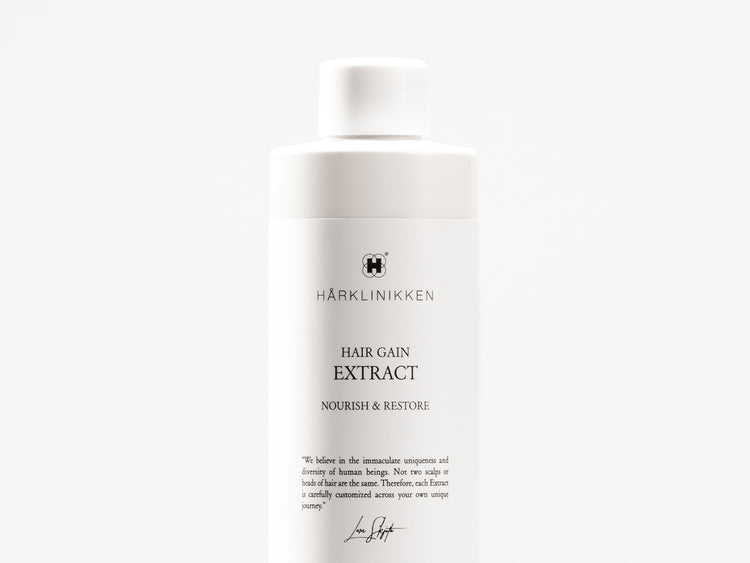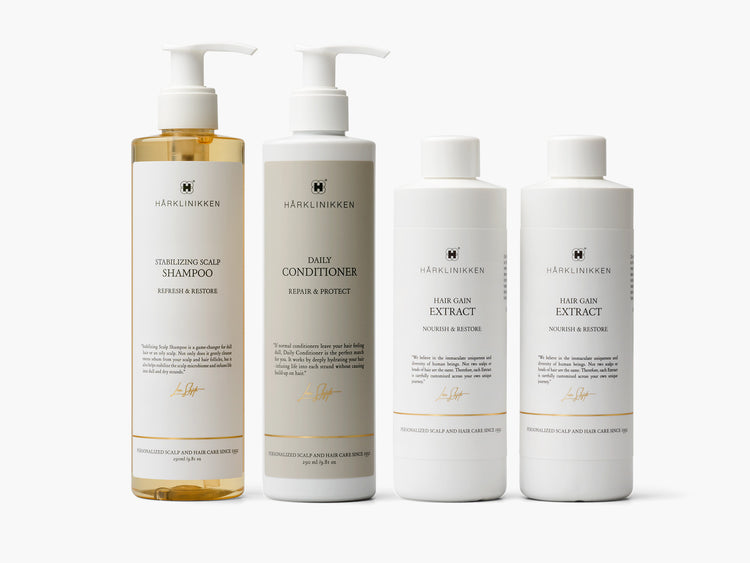From work troubles to illness, grief, childbirth and beyond, stress can be caused by both physical and emotional concerns – and it can take a toll on more than just your mental wellbeing. Stress presents itself in many ways, some more easily identified than others. Recognised by experts as one of the key contributors to hair loss and thinning, stress impacts hair health, quality and growth potential.
How does stress cause hair loss and thinning?
In response to prolonged or heightened stress, the body creates a hierarchy of functions that deprioritises non-essential tasks such as hair growth. This process disrupts the hair’s normal lifecycle by prematurely shifting hairs out of their growth phase and into their resting and shedding phases – resulting in hair loss and thinning.
Types of stress-related hair loss?
- Alopecia Areata
Alopecia Areata is a chronic autoimmune disorder that’s inherited genetically. It causes the body's immune system to attack the hair follicles, resulting in bald patches of hair loss that can occur on any part of the body, but most commonly appear on the scalp, facial hair, eyebrows and eyelashes.Experts have yet to determine a specific cause behind this inflammatory immune response, but it’s widely believed that high levels of stress play a key role in triggering it.
- Trichotillomania
Trichotillomania is a mental health condition that causes individuals to compulsively and repeatedly pull individual strands of hair out from the root. Hair loss as the result of trichotillomania often occurs at the scalp, eyelashes and eyebrows but is not specific to one area of the body. Individuals who suffer from trichotillomania report that the act of hair-pulling induces feelings of relief that soothe anxiety and tension, leading experts to believe that heightened stress can trigger the onset of the disorder.
- Telogen Effluvium
Telogen Effluvium is a form of hair loss that occurs during periods of emotional or physical stress. This excessive hair shedding around the top of the head causes noticeable thinning and loss of density. It is triggered by stress-related hormonal changes that shorten the hair’s growth cycle – leading hairs to shift prematurely out of their growth phase and into their resting and shedding phases.
Can stress-related hair loss be reversed?
- Alopecia Areata
Alopecia Areata can recur multiple times in a person’s life, but it is a temporary, non-scaring form of hair loss that doesn’t damage the hair follicle. That means the likelihood of hair growing back is excellent: in fact, only 5-10% of people dealing with Alopecia Areata will experience a progression to complete loss of scalp hair (Alopecia Totalis) or whole-body hair loss (Alopecia Universalis). Approximately 50% of people experience spontaneous hair regrowth within a year. Treatment for alopecia areata includes the application of steroid creams and injections to the affected areas.
- Trichotillomania
Repeatedly pulling hair out from the root can cause damage and scarring that impacts the follicle’s ability to grow hair. Although regrowth is possible, it varies from person to person and is dependent on the severity of hair loss.Trichotillomania is considered a mental health condition that is commonly treated with talking therapies such as Cognitive Behavioural Therapy to address what triggers the individual’s compulsion.
- Telogen Effluvium
Telogen Effluvium is a temporary form of hair loss that’s completely reversible in most cases, with hair commonly growing back within three to six months of the stressor being resolved – and the hair growth cycle returning to normal. However, if the cause of stress remains unresolved, the hair growth cycle remains disrupted and the hair stays in its shedding phase, prolonging the hair loss.
Do antidepressants and anti-anxiety medications cause hair loss?
Antidepressant medications work through several pathways to help individuals manage common mood disorders such as anxiety and depression. Many come with a list of potential side effects, with hair loss being one of them. Although uncommon, some anti-depressant medications can contribute to hair loss by shortening the growth phase (anagen phase) of the hair cycle. When this happens, the hair follicles prematurely shift into the resting phase where they become inactive before shedding. This type of hair loss is generally temporary, but if you’re concerned that prescribed medications are causing your hair to thin or shed excessively, contact your healthcare provider to discuss alternatives and solutions.
How to avoid stress-related hair loss:
Avoiding stress altogether isn’t possible, but there are many things we can do to reduce it – therefore reducing its effect on our bodies.
- Find healthy ways to cope with stress
Making time to decompress is essential to reducing the effects of stress on your body. Whether you meditate, read or go for a walk, find a calming practice that helps to relieve feelings of stress and anxiety.
- Eat a balanced diet
Restrictive diets that limit how much food you consume can cause the body physical stress and lead to nutrient deficiencies – exacerbating hair loss and thinning. It’s important to eat a balanced diet comprised of unprocessed, nutrient-rich, fresh food – including plenty of fruit and vegetables, whole grains, protein and healthy fats.
- Get enough sleep
From muscle repair to hormone regulation, sleep plays a key role in various bodily processes, with studies showing that insufficient sleep can increase stress levels. To ensure you’re getting the right amount of rest, aim for seven to nine hours of sleep a night. It's crucial to make sleep a priority, and many individuals can learn to get better quality sleep once they dedicate time and attention to it.
- Take a sophisticated hair supplement
Developed over a decade and comprising only well-studied ingredients at their most efficacious levels, our Hair Supplement* takes a dual approach to hair loss and thinning. This innovative blend addresses three triggers (including stress, DHT sensitivity and nutrient deficiencies) while also supporting five factors essential to hair growth, health, strength and density. Our formulation includes AnaGainTM Nu Organic Pea Shoot Extract to promote denser-looking hair; Saw Palmetto Extract to visibly boost hair thickness; KSM-66® Ashwagandha Root to reduce feelings of stress; Lactobacillus casei to provide probiotic gut support and to help increase nutrient absorpt.
* Hårklinikken has decided to launch the new Hair Supplement in the US first, with hopes to extend its availability to other markets in the future.

Unsure where to start?
We only accept candidates who we believe we can help, which is why our online Hair Assessment is the best place to start. Based on your results, you will either qualify for immediate treatment or we will organize a consultation.




